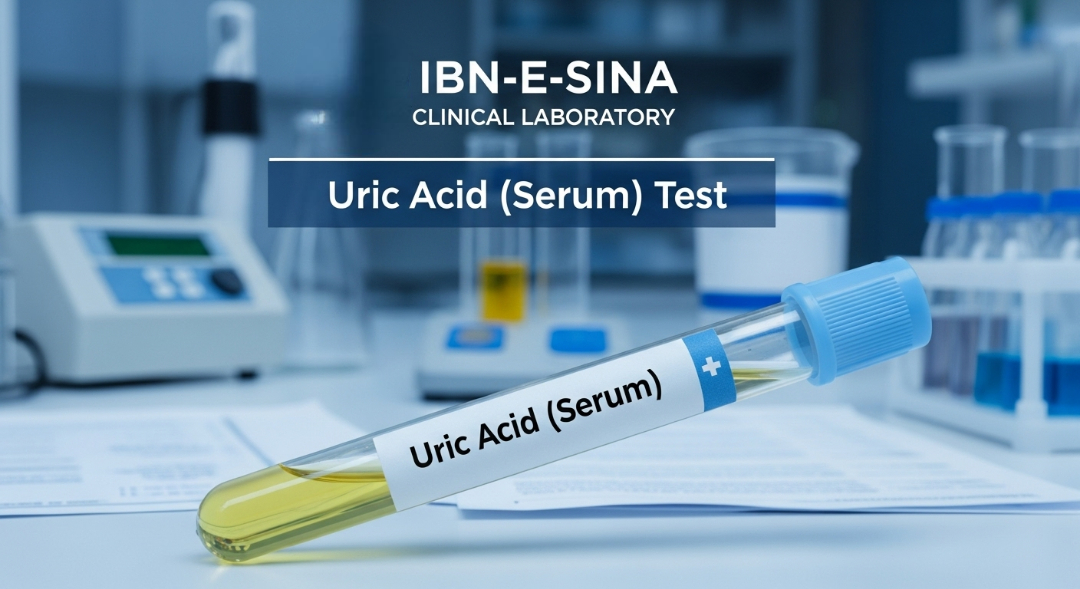The Uric Acid Test is an essential diagnostic tool that helps evaluate kidney function, metabolic balance, and the risk of gout or kidney stones. At Ibn-E-Sina Clinical Laboratory, this test is performed using modern, fully automated analyzers to ensure precise and reliable results. Uric acid is a natural waste product created when the body breaks down purines, which are found in foods such as red meat, organ meats, seafood, and alcoholic beverages.
When the kidneys fail to eliminate uric acid efficiently, levels rise in the bloodstream, resulting in hyperuricemia, a condition linked to gout, arthritis, and kidney disorders. The Ibn-E-Sina Lab provides accurate testing for early detection and management of these issues, helping patients across Pakistan take better control of their health through affordable and dependable diagnostic services.
What Is a Uric Acid Test?
The uric acid test measures the concentration of uric acid in your blood or urine. Doctors use it to assess how effectively your body produces and eliminates this compound. Normally, uric acid dissolves in the blood, passes through the kidneys, and leaves the body in urine.
However, if production increases or excretion decreases, uric acid accumulates, causing painful crystal deposits in joints and other tissues. Medical professionals recommend this test to:
-
Diagnose or monitor gout and other arthritic conditions
-
Evaluate kidney function and detect renal impairment
-
Assess patients undergoing chemotherapy or radiation therapy
-
Investigate causes of unexplained joint pain or metabolic imbalance
Why Is This Test Important?
A uric acid evaluation is vital because it uncovers metabolic irregularities that might not yet show visible symptoms. Elevated levels can lead to inflammation, swelling, and discomfort, while very low levels may indicate liver disease or certain genetic issues.
By detecting abnormal uric acid concentrations early, doctors can:
-
Prevent chronic gout and kidney stone formation
-
Monitor treatment response for metabolic disorders
-
Protect kidney function by identifying filtration problems
-
Guide dietary and lifestyle adjustments for long-term health
When Should You Get Tested?
You should consider this test if you experience:
-
Persistent joint pain or tenderness (especially in toes or ankles)
-
Swelling, redness, or stiffness around joints
-
Signs of kidney stones such as back or flank pain and reduced urination
-
Unexplained fatigue or high blood pressure
Additionally, individuals with a family history of gout or those taking medications like diuretics should undergo periodic testing at a reliable diagnostic center such as Ibn-E-Sina Clinical Laboratory.
How to Prepare for the Test
Preparation is simple but important for accurate readings:
-
Fasting: Not required unless combined with other blood tests.
-
Food Restrictions: Avoid purine-rich items (red meat, shellfish, alcohol) for 24 hours prior.
-
Medication Disclosure: Inform your doctor about drugs like aspirin, diuretics, or vitamin C supplements that can alter results.
-
Hydration: Drink plenty of water before the blood draw.
-
Avoid Strenuous Activity: Heavy exercise may temporarily raise uric acid levels.
How the Test Is Performed at Ibn-E-Sina Clinical Laboratory
At Ibn-E-Sina Lab, skilled technicians follow standardized safety protocols to ensure accuracy and comfort.
Step-by-Step Process
-
Sample Collection: A small blood sample is drawn from a vein, or a urine sample is collected depending on test type.
-
Labeling & Processing: Samples are tagged and transferred to the biochemistry section.
-
Analysis: Advanced analyzers measure uric acid concentration using automated colorimetric methods.
-
Quality Control: Internal and external quality checks verify precision.
-
Reporting: Results are usually ready within 24 hours and can be viewed online or collected at any branch.
The lab’s commitment to hygiene, patient safety, and diagnostic reliability has made it a trusted choice throughout Pakistan.
Uric Acid Test Report & Normal Values
The Uric Acid Test Report shows normal reference ranges for men, women, and children (values may differ slightly between laboratories):
| Parameter | Normal Range |
|---|---|
| Men | 3.4 – 7.0 mg/dL |
| Women | 2.4 – 6.0 mg/dL |
| Children | 2.0 – 5.5 mg/dL |
Reference ranges may differ slightly between laboratories.
Interpretation
-
High levels (Hyperuricemia): Possible gout, renal dysfunction, or high-purine diet.
-
Low levels (Hypouricemia): Possible liver disease, certain medications, or genetic disorders.
Always consult a doctor for personalized interpretation and treatment planning.
Understanding Abnormal Results
Elevated Uric Acid
Common causes include:
-
Gout or rheumatoid arthritis
-
Chronic kidney disease
-
Excessive consumption of red meat or alcohol
-
Dehydration
-
Chemotherapy or radiation therapy side effects
Low Uric Acid
Possible causes:
-
Liver dysfunction
-
Malnutrition or low purine intake
-
Medication effects (e.g., allopurinol)
-
Genetic metabolic disorders
Follow-up testing or imaging may be required for a complete diagnosis.
Managing Uric Acid Levels Naturally
While lab testing identifies the issue, maintaining balance requires daily care:
-
Hydrate well: Aim for 8–10 glasses of water a day.
-
Limit alcohol & sugar: Especially beer and sweetened drinks.
-
Eat smart: Choose low-purine foods, fruits, and vegetables.
-
Maintain a healthy weight: Gradual weight loss reduces uric acid buildup.
-
Add vitamin C and cherries: They may help lower levels naturally.
Uric Acid Test Cost at Ibn-E-Sina Clinical Laboratory
The Uric Acid Test cost at Ibn-E-Sina Clinical Laboratory is Rs. 800.
This includes expert sample collection, laboratory analysis, and an online report. Patients can easily book the test online or visit the nearest branch for walk-in services.
Below is a list of related uric-acid-based investigations offered by the lab:
| Test Name | Also Known As | Sample Type | Price (PKR) |
|---|---|---|---|
| Uric Acid (Serum) | Serum Urate, UA | Blood | 800 |
| Uric Acid (Spot Urine) | Urate, UA | Urine (Spot) | 700 |
| Uric Acid (24 hrs Urine) | Urate, UA | Urine (24 Hours) | 800 |
| Uric Acid / Creatinine Ratio | – | Urine | 900 |
All prices are updated for 2026 and may vary slightly by branch.
Ibn-E-Sina Clinical Laboratory Uric Acid Test Price in Pakistan
The Ibn-E-Sina Clinical Laboratory Uric Acid Test Price in Pakistan is Rs. 800. Related urine-based tests range between Rs. 700 – 900, giving patients multiple options depending on their doctor’s recommendation. You can book any of these online through All Lab Tests and visit the nearest Ibn-E-Sina branch for sample submission.
The laboratory’s affordable pricing and accurate diagnostics make it one of the best options for routine metabolic testing nationwide.
Where to Book Your Uric Acid Test in Pakistan
Searching for a “Uric Acid Test near me”? You can easily compare Uric Acid Test costs in Pakistan, review updated Ibn-E-Sina Test Charges 2026, and book appointments through All Lab Tests.
Branches of Ibn-E-Sina are conveniently located in Karachi, Lahore, Islamabad, Faisalabad, Multan, and many other cities, ensuring nationwide accessibility.
Book Your Uric Acid Test at Ibn-E-Sina Clinical Laboratory
Take charge of your health today by booking a Uric Acid Test at Ibn-E-Sina Clinical Laboratory.
Enjoy:
-
Easy online booking and home sample collection
-
Quick turnaround time with digital reports
-
Reliable and precise analysis
-
Affordable prices across Pakistan
Stay informed, stay healthy, and rely on Ibn-E-Sina Clinical Laboratory your trusted partner in diagnostics and preventive healthcare.










